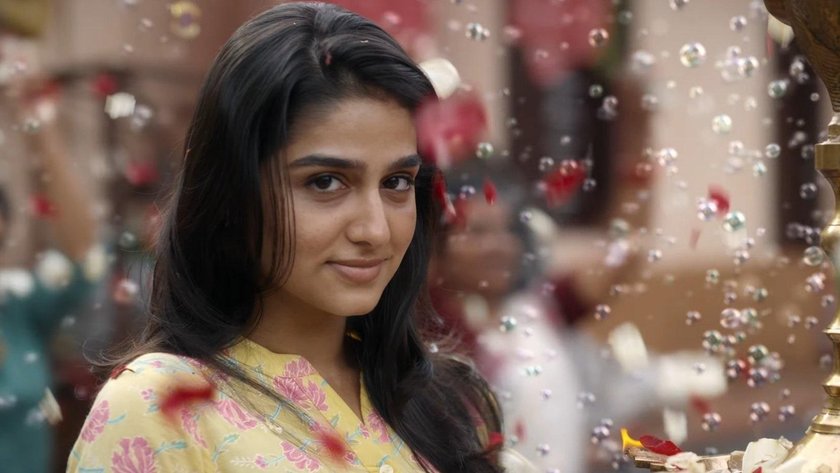
Painkili (2025) – A Quirky Valentine’s Romp with Heart and Hiccups
Directed by debutant Sreejith Babu and released on Valentine’s Day, February 14, 2025, Painkili is a Malayalam romantic comedy that flutters into theaters with the backing of Fahadh Faasil and Friends and Urban Animal. Starring Sajin Gopu as the eccentric Suku Sujithkumar and Anaswara Rajan as the feisty Sheeba Baby, with a lively supporting cast including Roshan Shanavas, Jisma Vimal, and Abu Salim, this $5 million (estimated) romp clocks in at 139 minutes. It’s a blend of slapstick silliness and tender moments, riding the wave of Gopu’s post-Aavesham hype. Early buzz pegs it at 6.2 on IMDb, with global box office trickling past $88K in its first weeks—a modest start for a film aiming to charm with quirky chaos but stumbling on uneven execution.
Plot Overview: A Collision of Cringe and Cupid
The story kicks off in a sleepy Kerala village, where Suku Sujithkumar (Sajin Gopu) runs a modest printing shop, dreaming big through cringe-worthy Facebook poetry like “Love is a rose, prickly but sweet.” He’s a small-town everyman—lanky, earnest, and blissfully unaware of his own absurdity—surrounded by a middle-class family who moonlight as caterers and a posse of bumbling pals, including the hapless Paachan (Roshan Shanavas). Life’s predictable until a trip to Coimbatore to buy a second-hand printer goes awry. Caught in a petty legal snag—perhaps a mix-up over a bounced check or a scuffle with a shady vendor—Suku hatches a desperate plan: fake insanity to snag a mental health certificate and dodge the law. Cue wild-eyed theatrics and a nod to classics like Kavadiyattam, as he flails through psych evaluations, crooning “Heart attack, heart attack…” to baffled doctors.
Meanwhile, Sheeba Baby (Anaswara Rajan) is a whirlwind in a different orbit. A college dropout with a rebellious streak, she’s suffocating under her family’s relentless push for an arranged marriage. Her father (Abu Salim), a gruff traditionalist, and her meddling relatives see her as a bride-in-waiting; Sheeba sees herself as a bird caged. Her escapes are literal—leaping off rooftops, scaling walls—only to be hauled back by her exasperated dad. One such breakout lands her, quite by accident, at Suku’s doorstep mid-meltdown. He’s ranting about imaginary foes; she’s dodging a suitor’s photo. Their meet-cute is less roses-and-rain than a clash of chaos—Suku mid-“madness,” Sheeba mid-flight.
What follows is a whirlwind of loud gags and unlikely romance. Suku’s ruse unravels as his family—dad barking orders, mom fretting over curry—suspects he’s genuinely lost it. Paachan, ever the loyal sidekick, trips over himself to help, while village gossips spin tales of Suku’s “condition.” Sheeba, hiding out, finds his antics oddly endearing; he’s smitten by her fire. The second half shifts gears—less slapstick, more heart—as Suku grapples with his fake madness turning real (a la Thaniyavarthanam) and Sheeba softens toward a guy who’s as lost as she is. The climax, rushed and sentimental, sees them confessing love amid a village wedding gone haywire—think runaway brides, toppled laddoos, and a teary “I’m not crazy, I’m crazy for you.” It’s absurd, sweet, and a touch overstretched.
Themes & Emotional Layers
Painkili wears its quirks proudly, leaning into Jithu Madhavan’s playbook: oddballs in absurd binds, a la Romancham or Aavesham. The central theme is freedom versus expectation. Suku’s feigned madness mirrors Sheeba’s literal escapes—both chafe against systems (law, family) pinning them down. It’s a rom-com twist on rebellion, asking: Can love bloom in chaos? The answer’s a tentative yes, though the film’s late stab at mental health commentary—Suku’s ostracism, his “is this real?” spiral—feels tacked-on, per critics like The Hindu.

Identity and authenticity ripple beneath the laughs. Suku’s social media persona—cheesy, performative—clashes with his bumbling reality, while Sheeba’s defiance masks a longing for purpose beyond defiance. Their romance, born of pretense, stumbles toward something genuine, though the script doesn’t fully mine this depth. There’s a faint class critique too—Suku’s modest roots versus Sheeba’s slightly better-off clan—but it’s buried under pratfalls.
The Valentine’s Day release nods to love as liberation, yet Painkili sidesteps mushy tropes. It’s less about grand gestures, more about two misfits finding solace in shared weirdness. The overstuffed runtime, though, dilutes this charm—139 minutes of gags and detours test patience where tighter editing could’ve sharpened the heart.
Cinematic Style & Performances
Sreejith Babu, stepping from acting (Maheshinte Prathikaaram) to directing, channels Madhavan’s chaotic energy with mixed results. The cinematography by Arjun Sethu paints Kerala in lush, cluttered strokes—verdant fields, cramped homes, dusty streets—grounding the absurdity in a lived-in world. Visual gags abound: Suku levitating in a fever dream, Sheeba bubble-blowing mid-escape. Yet, the first half’s forced comedy—overloud relatives, overdone quirks—feels like a toothpaste tube squeezed dry, as India Today noted.
Justin Varghese’s score is a standout, weaving vocal quirks (Suku’s “Heart attack…” ditty) with peppy beats and tender strings. It’s a sonic thread tying the slapstick to the sentiment, elevating scenes that stumble on-screen. Editing by Kiran Das, though, falters—pacing drags, especially in the second half’s meandering detours, leaving the climax rushed despite its emotional aim.
Sajin Gopu is the film’s beating heart. Fresh off Aavesham’s Ambaan, he owns Suku with physical flair—flopping mid-air, mugging for laughs, then peeling back layers of angst. X posts hail him as “a one-man riot,” his pivot to lead a win even if the script wobbles. Anaswara Rajan, a proven talent (Neru), struggles as Sheeba. Her loud, shrill energy aims for spunk but feels artificial, critics say—her arc underdeveloped, her chemistry with Gopu sparking only in fits. Roshan Shanavas shines as Paachan, a pratfalling foil whose deadpan loyalty lands laughs. Abu Salim, as Suku’s dad, grumbles with gusto, while Jisma Vimal adds zing as a nosy neighbor. Cameos—like Lijo Jose Pellissery as a gruff cop—nod to the team’s roots but don’t lift the whole.

Reception & Cultural Ripple
As of March 28, 2025, Painkili’s early haul—$88K+ globally—suggests a slow burn, not a smash. Made on a lean $5 million (estimated), it’s no Aavesham (Fahadh Faasil’s star power a glaring absence), but it banks on Gopu’s rising stock. IMDb’s 6.2 reflects its split verdict: fans of Gopu’s gusto and stray gags (Paachan’s flails, dad’s rants) cheer, while detractors—per The Hindu, India Today—slam “lazy writing” and “forced humor.” X posts mirror this divide: “Sajin carries it, rest is meh” versus “Oddball charm, don’t overthink it.” Some call it a “niche hit,” others a “misfire after Jithu’s highs.”
For Malayalam cinema, Painkili fits 2025’s rom-com wave—think Bromance or Get-Set Baby—but lacks the polish of Madhavan’s directorial outings. Its Valentine’s timing courts couples craving light fun, yet its loudness and runtime may alienate casual viewers. Gopu’s breakout keeps it afloat; without him, it’d sink. The OTT debut on Manorama Max (date TBD) could widen its reach—digital audiences might forgive its flaws for a cozy watch.
Final Verdict
Painkili (2025) is a quirky Valentine’s fling with heart, if not heft. Sajin Gopu’s riotous Suku and a handful of laughs—Paachan’s flops, Varghese’s tunes—buoy a film that stumbles on uneven comedy and a meandering plot. Anaswara Rajan’s Sheeba aims high but lands flat, and Babu’s debut, while spirited, lacks the finesse to match Madhavan’s best. At 2 hours 19 minutes, it’s a shaggy dog story that could’ve been a tight romp. For Gopu buffs or rom-com diehards, it’s a loud, lovable mess worth a spin—best paired with popcorn and low expectations.











